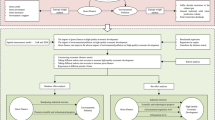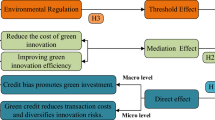Abstract
Achieving the integration of green and economic development has become the key to promoting high-quality economic development in China. In the context of dual-cycle development, a higher level of opening up will be an important prerequisite for achieving this goal. This article uses panel data from 30 provinces in China from 2008 to 2020 as the research sample and takes the establishment of the Pilot Free Trade Zone (PFTZ) as a quasi-natural experiment. By constructing the Green Dual-Cycle High-Quality Development (GDHD) indicator system, taking green finance as the starting point, industrial structure adjustment and technological innovation ability as the perspective of differentiation. This article uses the difference-in-differences method and the intermediary effect model to explore the impact of PFTZ on regional green high-quality development. The study found that establishing PFTZ has significantly promoted regional green high-quality development, and this effect remains valid under multiple robustness tests. Further research has found that, under the advantages of green finance in PFTZ, regional industrial restructuring and the improvement of green innovation capabilities are the main ways to achieve this goal. This study provides a new development path for China's PFTZ to promote high-quality regional development better.





Similar content being viewed by others
Data availability
The data that support the findings of this study are available from http://www.stats.gov.cn. The datasets generated during and analyzed during the current study are available from the corresponding author upon reasonable request.
References
Abbasab J, Sağsana M (2019) Impact of knowledge management practices on green innovation and corporate sustainable development: a structural analysis. J Clean Prod 229:611–620. https://doi.org/10.1016/j.jclepro.2019.05.024
An G, Zi W (2020) Research on green finance in the aspect of promoting the sustainable development of the free trade zone. Public Financ Res 447(05):117–129
Beck T, Levine R, Levkov A (2010) Big Bad BANKS? The winners and losers from bank deregulation in the United States. J Financ 65(5):1637–1667. https://doi.org/10.1111/j.1540-6261.2010.01589.x
Bhatnagar S, Sharma D (2022) Evolution of green finance and its enablers: a bibliometric analysis. Renew Sustain Energy Rev 162:112405. https://doi.org/10.1016/j.rser.2022.112405
Bryan BA, Gao L, Ye Y et al (2018) China’s response to a national land-system sustainability emergency. Nature 559(7713):193–204. https://doi.org/10.1038/s41586-018-0280-2
Chang Y, Lai L (2023) Effects and mechanisms of China’s pilot free trade zones on green and high-quality development from the dual-circulation perspective. Sustainability 15(2). https://doi.org/10.3390/su15020947
Chen L, Huo C (2022) The Measurement and influencing factors of high-quality economic development in China. Sustainability 14(15). https://doi.org/10.3390/su14159293
Ding L, Wu M, Jiao Z, Nie Y (2022) The positive role of trade openness in industrial green total factor productivity—provincial evidence from China. Environ Sci Pollut R 29:6538–6551. https://doi.org/10.1007/s11356-021-16164-8
Eaton J (1986) Market structure and foreign trade: Increasing returns, imperfect competition and the international economy: Elhanan Helpman and Paul R. Krugman. J Int Econ 21:183–187
Feng M, Guo H (2019) Research on the evaluation of high-quality economic development based on factor analysis. J Sci Ind Res India 78(12):827–830
Goodman-Bacon A (2021) Difference-in-differences with variation in treatment timing. J Econ 225(2):254–277. https://doi.org/10.1016/j.jeconom.2021.03.014
Halaszovich TF, Kinra A (2020) The impact of distance, national transportation systems and logistics performance on FDI and international trade patterns: results from Asian global value chains. Transp Policy 98:35–47. https://doi.org/10.1016/j.tranpol.2018.09.003
Hsieh CT, Li N, Ossa R, Yang M (2020) Accounting for the new gains from trade liberalization. J Int Econ 127:103370. https://doi.org/10.1016/j.jinteco.2020.103370
Hsu CC, Quang-Thanh N, Chien F, Li L, Mohsin M (2021) Evaluating green innovation and performance of financial development: mediating concerns of environmental regulation. Environ Sci Pollut R 28:57386–57397. https://doi.org/10.1007/s11356-021-14499-w
International Energy Agency(2022) Global energy review: CO2 emissions in 2021. https://www.iea.org.
Isabel D, Marta F (2015) Knowledge spillovers in science and technology parks: how can firms benefit most? J Technol Tran 40:70–84. https://doi.org/10.1007/s10961-013-9329-4
Jiang S, Liu X, Liu Z, Shi H, Xu H (2022) Does green finance promote enterprises’ green technology innovation in China? Front Env Sci-Switz 10. https://doi.org/10.3389/fenvs.2022.981013
Jiang Y, Wang H, Liu Z (2021) The impact of the free trade zone on green total factor productivity -evidence from the Shanghai pilot free trade zone. Energ Policy 148. https://doi.org/10.1016/j.enpol.2020.112000
Lee CC, Lee CC (2022) How does green finance affect green total factor productivity? Evidence from China. Energ Econ 107. https://doi.org/10.1016/j.eneco.2022.105863
Li C, Chen Z, Wu Y, Zuo X, Jin H, Xu Y, Zeng B, Zhao G, Wan Y (2022a) Impact of green finance on China’s high-quality economic development, environmental pollution, and energy consumption. Front Env Sci-Switz 10. https://doi.org/10.3389/fenvs.2022.1032586
Li G, Gao D, Li Y (2022b) Dynamic environmental regulation threshold effect of technical progress on green total factor energy efficiency: evidence from China. Environ Sci Pollut R 29:8804–8881. https://doi.org/10.1007/s11356-021-16292-1
Li G, Liao F (2022) Input digitalization and green total factor productivity under the constraint of carbon emissions. J Clean Prod 377. https://doi.org/10.1016/j.jclepro.2022.134403
Li P, Lu Y, Wang J (2016) Does flattening government improve economic performance? Evidence from China. J Dev Econ 123:18–37. https://doi.org/10.1016/j.jdeveco.2016.07.002
Li X, Xu Q, Wang H (2023) Environmental effects of the establishment of pilot free trade zones: evidence from Chinese resource-based enterprises. Environ Sci Pollut R 30:21384–21403. https://doi.org/10.1007/s11356-022-23722-1
Liang J, Song X (2022) Can green finance improve carbon emission efficiency? Evidence from China. Front Env Sci-Switz 10. https://doi.org/10.3389/fenvs.2022.955403
Liu F (2019) High-speed rail, knowledge spillover, and urban innovation – evidence from 278 cities. Financ Trade Res 190(4):14–29
Lou B, Xie B, Liu P, Zhu M, Xu W (2023) Evaluating the impact of free trade zone construction on urban air pollution in China-empirical evidence from a spatial differences-in-differences approach. Front Env Sci 10. https://doi.org/10.3389/fenvs.2022.1075138
Lu W, Wu H, Geng S (2021) Heterogeneity and threshold effects of environmental regulation on health expenditure: considering the mediating role of environmental pollution. J Environ Manage 297:113276. https://doi.org/10.1016/j.jenvman.2021.113276
Mohebi M, Mirshojaee F (2019) Microdata analysis of the consequences of free trade port policy: the case of Iran free zones. Appl Econ 52:2250–2260. https://doi.org/10.1080/00036846.2019.1687841
Ou J, He L (2023) Opportunity or challenge? Carbon emissions reduction under new development pattern of dual circulation. Sustainability 15(3). https://doi.org/10.3390/su15031757
PedroAloise G, Macke J (2017) Eco-innovations in developing countries: the case of Manaus free trade zone (Brazil). J Clean Prod 168:30–38. https://doi.org/10.1016/j.jclepro.2017.08.212
Philip LD, Sertoglu K, Akadiri SS, Olasehinde-Williams G (2021) Foreign direct investment amidst global economic downturn: is there a time-varying implication for environmental sustainability targets? Environ Sci Pollut R 28(17):21359–21368. https://doi.org/10.1007/s11356-020-12053-8
Prescott EC (1998) Lawrence R. Klein lecture 1997: Needed: a theory of total factor productivity. Int Econ Rev:525–551. https://doi.org/10.2307/2527389
Ren S, Hao Y, Wu H (2022) How does a green investment affect environmental pollution? Evidence from China. Environ R Econ 81:25–51. https://doi.org/10.1007/s10640-021-00615-4
Ren S, Hao Y, Xu L, Wu H, Ba N (2021) Digitalization and energy: how does internet development affect China’s energy consumption? Energ Econ 98:105220. https://doi.org/10.1016/j.eneco.2021.105220
Seyoum B, Ramirez J (2012) Foreign trade zones in the United States: a study with special emphasis on the proposal for trade agreement parity. J Econ Stud 39:13–30. https://doi.org/10.1108/01443581211192080
Wang A, Hu Y, Li Y, Rao S, Lin W (2022b) Do pilot free trade zones improve the green total factor productivity? Evidence from a quasi-natural experiment in China. Environ Sci Pollut R 29(50):75307–75321. https://doi.org/10.1007/s11356-022-21003-5
Wang B, Chen H, Chen R, Zeng W, Ye L (2023) Does the green development of cities need high-level opening up? A quasi-natural experiment based on China’s pilot free trade zone. Sustainability 15(7). https://doi.org/10.3390/su15075810
Wang H, Zhang Y, Liu ZAK, Liu RK, Li KY (2022a) The impact and mechanisms of the Shanghai pilot free trade zone on the green total factor productivity of the Yangtze River Delta Urban Agglomeration. Environ Sci Pollut R 29(27):40997–41011. https://doi.org/10.1007/s11356-021-17758-y
Wu J, Chen TY (2022) Impact of digital economy on dual circulation: an empirical analysis in China. Sustainability 14(21). https://doi.org/10.3390/su142114466
Xu X (2023) Does green finance promote green innovation? Evidence from China. Environ Sci Pollut R 30(10):27948–27964. https://doi.org/10.1007/s11356-022-24106-1
Yanase A, Tsubuku M (2022) Trade costs and free trade agreements: implications for tariff complementarity and welfare. Int Rev Econ Financ 78:23–37. https://doi.org/10.1016/j.iref.2021.10.012
Ye P, Zhang H, Ma S, Yang F, Li Y (2022) A knowledge map study of an application of a smart land planning free-trade zone and China’s contribution. Land 11:909. https://doi.org/10.3390/land11060909
Yu D, Li X, Yu J, Li H (2021) The impact of the spatial agglomeration of foreign direct investment on green total factor productivity of Chinese cities. J Environ Manage 290. https://doi.org/10.1016/j.jenvman.2021.112666
Zhang Y, Xing C, Wang Y (2020) Does green innovation mitigate financing constraints? Evidence from China’s private enterprises. J Clean Prod 264. https://doi.org/10.1016/j.jclepro.2020.121698
Zeng YT, Wang F, Wu J (2022) The impact of green finance on urban haze pollution in China: a technological innovation perspective. Energies 15(3). https://doi.org/10.3390/en15030801
Zhao A, Wang J, Guan H (2022) Has the free trade zone construction promoted the upgrading of the city’s industrial structure? Sustainability 14(9). https://doi.org/10.3390/su14095482
Zheng J, Shao X, Liu W, Kong J, Zuo G (2021) The impact of the pilot program on industrial structure upgrading in low-carbon cities. J Clean Prod 290. https://doi.org/10.1016/j.jclepro.2021.125868
Zhou GL, Zhang ZN, Fei YL (2022a) How to evaluate the green and high-quality development path? An FsQCA approach on the china pilot free trade zone. Int J Env Res Pub He 19(1). https://doi.org/10.3390/ijerph19010547
Zhou G, Zhu J, Luo S (2022b) The impact of fintech innovation on green growth in China: mediating effect of green finance. Ecol Econ 193. https://doi.org/10.1016/j.ecolecon.2021.107308
Funding
This study has received financial support from the Philosophy and Social Science Foundation of Shanghai (2019BDS005).
Author information
Authors and Affiliations
Contributions
Y. C. conceived and designed conceptualization, methodology, investigation, project administration, and writing of the original draft. S. W. performed the experiments and wrote the manuscript. Y. C. and S. W. analyzed the data. S. W. performed data collection, writing original drafts, and software. All authors read and approved the final manuscript.
Corresponding author
Ethics declarations
Ethics approval and consent to participate
Not applicable.
Consent for publication
Not applicable.
Competing interests
The authors declare no competing interests.
Additional information
Responsible Editor: Nicholas Apergis
Publisher’s note
Springer Nature remains neutral with regard to jurisdictional claims in published maps and institutional affiliations.
Rights and permissions
Springer Nature or its licensor (e.g. a society or other partner) holds exclusive rights to this article under a publishing agreement with the author(s) or other rightsholder(s); author self-archiving of the accepted manuscript version of this article is solely governed by the terms of such publishing agreement and applicable law.
About this article
Cite this article
Chang, ., Wang, S. China’s pilot free trade zone and green high-quality development: an empirical study from the perspective of green finance. Environ Sci Pollut Res 30, 88918–88935 (2023). https://doi.org/10.1007/s11356-023-28729-w
Received:
Accepted:
Published:
Issue Date:
DOI: https://doi.org/10.1007/s11356-023-28729-w




